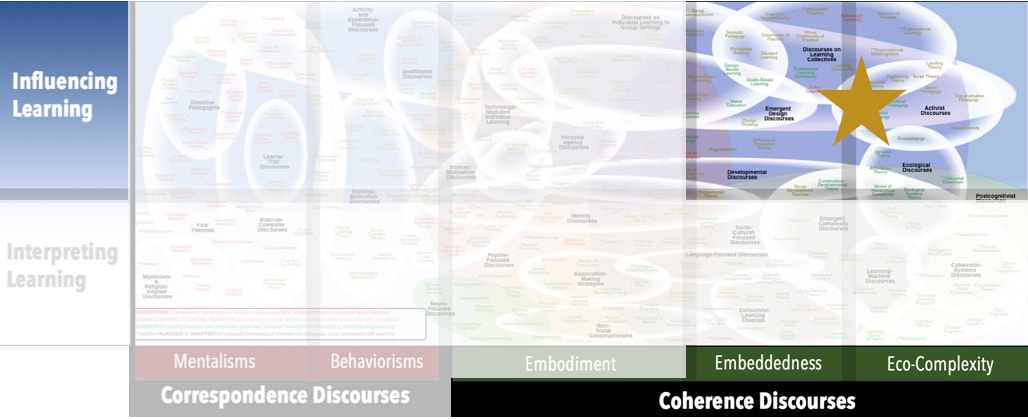AKA
Transformative Education
Non-Trivial Constructivisms encompass a range of learning theories that invoke a “learning as construing” – vs. a “learning as constructing” – metaphor. The construing–constructing distinction is critical, and it became an issue because the French verb construire can be translated as either “to construe” (i.e., to integrate elements to make sense of) or “to construct” (i.e., to build something).
Learn More...Eco-Complexity Discourses is a sub-category of Coherence Discourses. It is an umbrella term that reaches across perspectives on learning that refuse separations of human from nature, material from transcendent, and part from whole. Across Eco-Complexity Discourses, learning is understood as synonymous with evolution.
Learn More...Embeddedness Discourses comprise perspectives on learning that refuse separations of self from other and individual from collective. Perceived boundaries among persons and peoples are understood as heuristic conveniences, as collective phenomena are recognized to unfold from and to be enfolded in individual phenomena. Phrased differently, collective forms are understood as learning bodies.
Learn More...Transformative Learning is concerned with the expansion of consciousness through critical reflection on beliefs and experiences. It focuses on three sites of “perspective transformation”: psychological (self), convictional (beliefs), and behavioral (lifestyle). Transformative Learning involves rational efforts to analyze and reformulate habits of action and deep-seated assumptions.
Learn More...Embodiment Discourses comprise perspectives on learning that refuse a separation of mental and physical. Mental and physical are understood as integrated and inseparable aspects of the body. Phrased differently, the body is not seen as something that a learner learns through, but as the learner. Correspondingly, behaviors are not seen as goals or indications of learning, but as integral elements of learning.
Learn More...Socio-Cultural Theory begins with the assertion that what is learnable begins as externalized possibilities, which learners gradually internalize through imitation of others, rehearsal with others, and other modes of participation in culturally relevant activities. Social interaction is thus stressed as prior and fundamental to cognition; consciousness and cognition are the products of socialization.
Learn More...Proponents of Critical Pedagogy see formal education as inherently political – meaning that teaching and learning cannot be dissociated from issues of social justice. The overarching aim of Critical Pedagogy is the development of a “critical consciousness” – that is, awareness of the often-invisible connections between oppressions and the social, political, and cultural conditions that surround those oppressions.
Learn More...Focus
Participating to effect social and ecological justice
Principal Metaphors
- Knowledge is … scope of interpretations and actions
- Knowing is … critical consciousness
- Learner is … a change agent (individual or collective)
- Learning is … interrogating (the conditions of one’s existence) and participating (in efforts to enact meaningful change)
- Teaching is … learning alongside (i.e., interrogating and co-participating)
Originated
2000s
Synopsis
Transformative Pedagogy encompasses multiple educational emphases, with three particularly prominent clusters. One is, essentially, Critical Pedagogy – aligned with Socio-Cultural Theory and focused on collective action aimed at social justice. Another component is Transformative Learning, which is informed by Non-Trivial Constructivisms and more focused on affecting self perception, personal beliefs, and one's habits of acting. (Note that Transformative Pedagogy is distinct from, but sometimes conflated with Transformative Learning.) A third has a broader horizon. Informed by Eco-Complexity Discourses, it is also concerned with justice, but extends that concern to include matters of environmental sustainability and ecological health.
Commentary
Because source discourses are diverse and their aims are varied, different clusters of Transformative Pedagogy are subject to different commentaries – most of which can be extrapolated from the delimitations, limitations, and critiques of the theories of learning that are invoked within a cluster.
Authors and/or Prominent Influences
Diffuse, owing in large part to the wide range of theoretical influences.
Status as a Theory of Learning
Transformative Pedagogy is not a theory of learning, as it does not address the complex dynamics of learning.
Status as a Theory of Teaching
Transformative Pedagogy is a theory of teaching that is oriented toward recognizing and taking constructive action in situations that call for social and/or ecological justice.
Status as a Scientific Theory
Transformative Pedagogy does not meet our requirements of a scientific theory. However, it is informed by well-known and empirically grounded theories Embodiment Discourses, Embeddedness Discourses, and Eco-Complexity Discourses.
Map Location

Please cite this article as:
Davis, B., & Francis, K. (2020). “Transformative Pedagogy” in Discourses on Learning in Education. https://learningdiscourses.com.
⇦ Back to Map
⇦ Back to List

